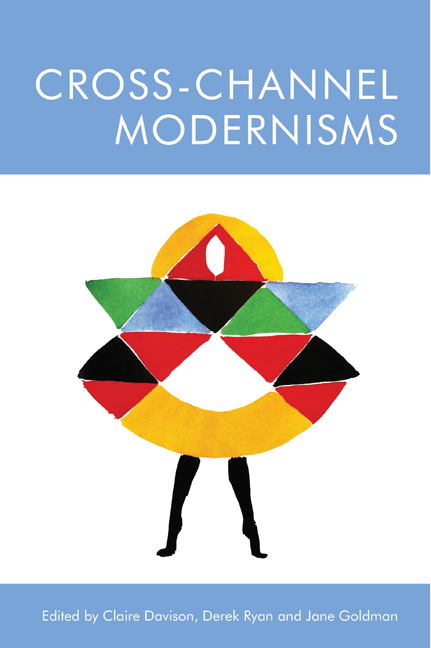Book contents
- Frontmatter
- Contents
- List of Figures
- Notes on Contributors
- Introduction: Cross-Channel (Transmanche) Modernisms
- Interlude: Translating
- 1 On Unknowing French? Rhythm and Le Rythme on a Cross-Channel Exchange
- 2 Impressions of Translation: Ford Madox Ford’s Cosmopolitan Literary Crossings
- 3 Sydney Schiff and Marcel Proust: Table-talk, Tribute, Translation
- Interlude: Fashioning
- 4 Cross-Channel Modernisms and the Vicissitudes of a Laughing Torso: Nina Hamnett, Artist, Bohemian and Writer in London and Paris
- 5 Jean Rhys’s comédie anglaise
- 6 Betray to Become: Departure in James Joyce’s A Portrait of the Artist as a Young Man
- Interlude: Mediating
- 7 Close Up and Cross-Channel Cinema Culture
- 8 Debussy at the Omega Workshops
- 9 Across the Other Channel: Elizabeth Bowen and Modernist Mediation
- Coda: ‘You, who cross the Channel’: Virginia Woolf, Departures and the Spectro-Aesthetics of Modernism 215
- Index
6 - Betray to Become: Departure in James Joyce’s A Portrait of the Artist as a Young Man
Published online by Cambridge University Press: 03 October 2020
- Frontmatter
- Contents
- List of Figures
- Notes on Contributors
- Introduction: Cross-Channel (Transmanche) Modernisms
- Interlude: Translating
- 1 On Unknowing French? Rhythm and Le Rythme on a Cross-Channel Exchange
- 2 Impressions of Translation: Ford Madox Ford’s Cosmopolitan Literary Crossings
- 3 Sydney Schiff and Marcel Proust: Table-talk, Tribute, Translation
- Interlude: Fashioning
- 4 Cross-Channel Modernisms and the Vicissitudes of a Laughing Torso: Nina Hamnett, Artist, Bohemian and Writer in London and Paris
- 5 Jean Rhys’s comédie anglaise
- 6 Betray to Become: Departure in James Joyce’s A Portrait of the Artist as a Young Man
- Interlude: Mediating
- 7 Close Up and Cross-Channel Cinema Culture
- 8 Debussy at the Omega Workshops
- 9 Across the Other Channel: Elizabeth Bowen and Modernist Mediation
- Coda: ‘You, who cross the Channel’: Virginia Woolf, Departures and the Spectro-Aesthetics of Modernism 215
- Index
Summary
Like many Irish writers, like many modernist writers, James Joyce left his country of origin to live in Europe: first in Paris, later in Trieste, then back in Paris again. Yet few Irish writers have more insistently characterised departure from Ireland as betrayal; few modernist writers have made of such departures the very condition for a modernist poetics of the self and of the nation. Joyce does both in his second published work of fiction, A Portrait of the Artist as a Young Man (1914/1916). The theme of departure as betrayal is already present in his previous work, Dubliners, where leaving Ireland constitutes both a breach of faith and the only hope for escaping the stifling stagnation and corrosive bitterness engendered by loyalties to family, country and religion. In A Portrait, the link established between treacherous departure and literary creation invites us to move beyond thematic treatments of betrayal, which are dominant in critical analyses of this question in Joyce's work. It encourages us to enquire instead into its role in the textual economy of this novel which relates how the protagonist becomes a writer. This shows betrayal to be a productive force, central to the generation of the work of art itself. However, this work of art does not transcend the logics of betrayal that produce it, rather it perpetuates its movement. And as betrayal implies a continuing relationship with the betrayed, the romantic vision of subjective and national identities the Joycean betrayer seeks to reject actually prove to be more persistent in their modernist reworking than might first appear. Likewise, leaving Ireland and her communities turns out to be a means of cleaving to them. For though the figure of the writer in this text does indeed quit Ireland, he never fully arrives on foreign shores. Rather he hovers, suspended, over the Channel's waves.
Etymologically, to betray takes us back to the Latin tradere: to deliver, hand over. The first definition listed in the Oxford English Dictionary is to ‘disloyally … give up to, or place in the power of, the enemy’, and this definition pervades those that follow, which can be divided into two main groups. The first involves disappointing or proving false to expectations, trust or faith.
- Type
- Chapter
- Information
- Cross-Channel Modernisms , pp. 138 - 154Publisher: Edinburgh University PressPrint publication year: 2020



